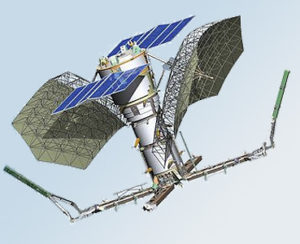
The Russian military plans to modernise its operations with the use of satellites.
Russian Defence Minister Sergei Shoigu made the announcement just two weeks after the U.S. Air Force announced that America must be prepared for space warfare.
In his remarks last week speaking on a conference call with representatives of the Russian rocketry and space industries, Shoigu stressed that Russia must deploy a modern orbital constellation of military satellites to support its army and navy. “Only with support from space will it be possible for the Armed Forces to reach maximum effectiveness,” he said. “Therefore, we are paying special attention to this area,”
“The Russian president has repeatedly stressed that our army and navy must not only meet the requirements of today, but to be prepared for tomorrow’s means of conducting armed struggle,” Shoigu continued. “The solution of this problem doubtlessly depends directly on the availability of a modern orbital constellation of military satellites,”
Shoigu said that the subject of his call included the production of the Pion-NKS, a next-generation radio surveillance satellite, and the Bars-M, Russia’s latest electro-optical area surveillance satellite. The A.I. Berg Central Science and Research Institute of Radio Engineering and the Progress Rocket Space Centre are engaged in the development, manufacture, and modernisation of Russia’s rocket and satellite technology, he added.
This announcement from Russia comes just two weeks after the U.S. Air Force declared its “tremendous emphasis” on preparations for space warfare. At the end of February 2018, General David Goldfein, U.S. Air Force Chief of Staff, said he believes that the United States was “going to be fighting from space in a matter of years,” thus making it “time for us as a service, regardless of specialty badge, to embrace space superiority with the same passion and sense of ownership as we apply to air superiority today.”
Only last week, the U.S. Director of National Intelligence, Daniel R. Coats, told the U.S. Senate that the United States intelligence community believes that:
Both Russia and China continue to pursue antisatellite (ASAT) weapons as a means to reduce US and allied military effectiveness. Russia and China aim to have nondestructive and destructive counterspace weapons available for use during a potential future conflict. We assess that, if a future conflict were to occur involving Russia or China, either country would justify attacks against US and allied satellites as necessary to offset any perceived US military advantage derived from military, civil, or commercial space systems. Military reforms in both countries in the past few years indicate an increased focus on establishing operational forces designed to integrate attacks against space systems and services with military operations in other domains.
Shoigu’s comments, however, indicate that Moscow’s intention is to make the Russian military similarly dependent upon satellites for greater operational effectiveness, but therefore potentially vulnerable to the antisatellite capabilities of other countries.
 SpaceWatch.Global An independent perspective on space
SpaceWatch.Global An independent perspective on space

